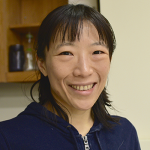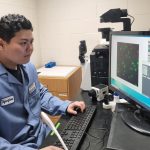Doctoral student Matthew Pittman awarded NIH training fellowship

Story by Catherine Graham and posted on the Department of Mechanical Engineering’s website.
The National Heart, Lung, and Blood Institute, part of the National Institutes of Health (NIH), has awarded mechanical engineering doctoral student Matthew Pittman the Ruth L. Kirschstein National Research Service Award Individual Predoctoral Fellowship. The award provides multiyear funding to promising doctoral students in health-related fields.
The four-year, $182,080 grant will provide Pittman with mentored research training and will support his dissertation work, which focuses on the role of viscosity in basic cell behavior and function.
Viscosity is a measure of a fluid’s resistance to flow. A fluid with high viscosity – for example, honey – does not flow as easily as something with a low viscosity, like water. Bodily fluids, such as mucus, saliva, and blood, also fall on a spectrum of viscosity. Previous research has indicated a connection between fluid viscosity and certain diseases; for example, abnormally high mucus viscosity has been observed in patients with cystic fibrosis, chronic lung disease, and cancer. But how cells are affected by altered viscosity, or why these changes can promote disease progression, is not well understood.
In one of the first studies of its kind, Pittman and colleagues are developing a new technique to characterize how cells respond to increased viscosity, with a special focus on cytoskeleton dynamics and cell migration.
“It’s very exciting to explore something that really hasn’t been studied before. This research direction actually grew out of an unrelated project, where we used viscous medium to limit Brownian motion of nanoparticles, and we saw some strange results,” said Pittman. “The more we thought and read about fluid viscosity in the body and in disease, the more we realized this was a very interesting biological question that no one had answered.”
Pittman plans to use synthetic body fluids, supplemented with a thickening agent, to simulate increased viscosity in vivo. With this method, he can analyze and model the effects of high viscosity on multiple cell types.
Pittman is particularly interested in the hypothesis that increased viscosity leads to remodeling of the cytoskeleton, triggering cell migration. Cancer cell migration is key for metastasis, so uncovering a potential catalyst for this process could benefit future cancer research.
“We see that cells behave much differently in viscous fluid than in normal culture medium. Our goal is to better understand the underlying mechanisms behind these responses. If we do, we can start to build a more complete picture of the role of viscosity in complex processes such as wound healing, pathogen clearing, and metastasis,” said Pittman. “Down the road, we hope our findings will allow for new viscosity-based treatments.”
Pittman is a fourth-year PhD candidate in the Mechanical Engineering of Wet-materials (MEOW) Lab, led by Yun Chen, assistant professor of mechanical engineering and associate faculty member at the INBT. He received his bachelor’s degree from Johns Hopkins with a double major in chemical and biomolecular engineering and East Asian studies.
Pittman said he is honored to receive the NIH fellowship and excited to continue his training at Hopkins.
“My team has been able to consult with clinicians, physicists, and computational modeling experts. When we’re looking for a new tool, a cutting-edge technique, or expert advice, there’s a very good chance we’ll be able to find it somewhere in the Hopkins research community.”





